Diaspora Theatre and the Yoruba Sacred Tradition:
Aimé Césaire‘s A Tempest
Diaspora Theatre and the Yoruba Sacred Tradition:
Aimé Césaire‘s A Tempest
Author(s): Lekan BalogunSubject(s): Theatre, Dance, Performing Arts, Language and Literature Studies, Fine Arts / Performing Arts, Studies of Literature, Comparative Study of Literature, Other Language Literature
Published by: Editura Casa Cărții de Știință
Keywords: Shakespeare; Cesaire; Yoruba;
Summary/Abstract: Poet and playwright, Aimé Césaire occupies a prominent place in the history of Caribbean literature generally, and postcolonial Shakespeare adaptation scholarship in particular. His adaptation of Shakespeare‘s The Tempest, entitled A Tempest, described by PeterDickinson as a ―classic of postcolonial drama,‖ has continually been examined by scholarsin light of how the play engages, and consequently exposes, Shakespeare‘s text as a―foundational allegory of the experience of colonization and the expression of culturalimperialism‖ (Dickinson 2002: 194-5). Most commentators have however neglected toexplore the play‘s cultural content, while those who did merely acknowledged without detailing how, and to what extent, Césaire has deployed African rituals both incharacterisation and in the area of theatricality. This essays re-examines the text withparticular attention on the ritual aesthetics under which the political metaphor issubsumed. The paper argues that the ritual aesthetics in question derives from the Yorubaepistemology, and then links diaspora theatre and Césaire‘s dramaturgy in the play to bothThe Tragedy of King Christophe (1963) and A Season in the Congo (1967), and to the same Yoruba ritual source
Journal: Cultural Intertexts
- Issue Year: 7/2017
- Issue No: 7
- Page Range: 33-53
- Page Count: 21
- Language: English

